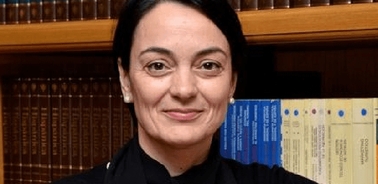- Home
- Noticias Y Eventos
- Qué Está Pasando
- Gloria Caballero Examines Financial Education Challenges In The Ie/ramón Areces Foundation Workshop
Gloria Caballero examines financial education challenges in the IE/Ramón Areces Foundation Workshop

Gloria Caballero, member of the think tank which is developing the Financial Education Plan launched by Spain’s National Securities Market Commission, the Bank of Spain, and the Spanish Government Agency for Insurance, took part on February 18 in the Financial Education series organized by the Ramón Areces Foundation and IE Business School.
During her address, Caballero underscored the need to ensure higher levels of financial literacy in society, stressing the importance of integrating financial skills as a core part of the education system from an early age. “The launch of the Organic Law for the Improvement of Educational Quality is an excellent opportunity. The main objective of the Financial Education Plan is to improve the working knowledge of finance among the general population in Spain, with a view to equipping citizens to take the economic decisions they will face at different stages of their lives.”
Caballero talked about what had been achieved since the National Securities Market Commission and Bank of Spain launched the financial education plan in 2008, being joined later by the Spanish Government Agency for Insurance. “Numerous initiatives were launched during the first five years the plan was in place, such as the www.finanzasparatodos.es website, and a pilot program aimed at including financial education as a core subject in schools. This initiative is now in place in over 400 schools, which are teaching finance to over 21,000 students aged around fifteen years old. Additionally, we have signed a collaboration agreement with a number of groups to provide every segment of the population with access to financial education, including homemakers, pensioners and disabled persons. We have also prepared numerous teaching materials adapted to the specific needs of each group.
Caballero believes that the plan has brought to the table a series of pending objectives. “The big goals for the 2013-2017 period are to introduce financial education into Spain’s education system as a mandatory subject, to equip students with an understanding of concepts like saving, debt, investment planning in early phases, followed by horizontal coverage of Spain’s entire younger generation as a medium-term objective.” Caballero stressed that this was a real need, and that the new education reform, the Organic Law for the improvement of Educational Quality, is an excellent opportunity address it.
The biggest contribution to the debate has come in the form of international initiatives. The efforts of major organizations have played a key role, including the OECD, which promoted the International Network on Financial Education (INFE) and served as coordinator and communicator of principles and good practices in the field of financial education worldwide, the European Commission’s group of experts, and even the G-20, which at its last summit openly stated its commitment to the principles of financial education that have been agreed on by countries worldwide.